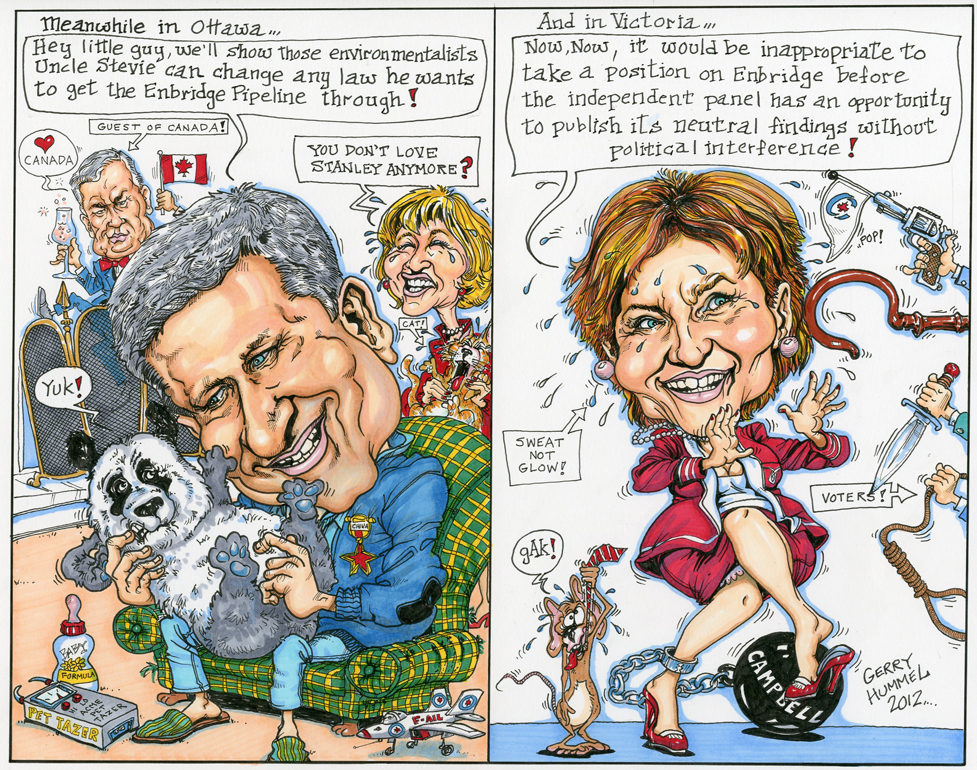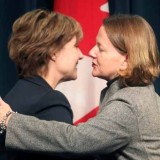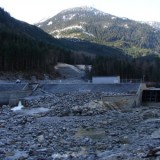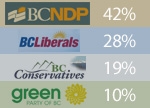New Poll results: NDP up to 42% while Liberals drop to 28%, Conservatives flat at 19%, Greens flat at 10%
It is clear now from four consecutive opinion polls that BC politics has entered a new phase, and that partisan support has shifted into a radically different paradigm.
The main change happened late last year when about 12 per cent of decided voters departed from the BC Liberal Party and joined the newly-revived BC Conservative Party (not necessarily all by membership of course); meanwhile support for the BC NDP was up only slightly and for the BC Green Party was down slightly.
Now the latest opinion poll from Angus Reid Public Opinion shows that that new paradigm has held and even increased in the last three months, most notably with a widening gap between the NDP, now up 2 to 42%, and the Liberals, down 3 to only 28%, which in an election held now would produce a large majority for the NDP; but also important is that support for the Conservatives went sideways, up only 1 to 19%, and for the Green Party was up 2 to only 10%.
That new paradigm of plunging Liberals, rising Conservatives and steady New Democrats first appeared in an Angus Reid poll last November and then was highlighted in two polls by Forum Research, one in December and another last month, and now they have been confirmed by the always-reliable Angus Reid firm, which surveyed 800 of its online panelists Jan. 27 to 29 and claims a variability of 3.5%.
That pattern – which shows up well in a colored graph contained in the report, which you can download here – suggests more than a few voters have lost hope that BC Liberal Party Premier Christy Clark will make major changes from the style and substance of her predecessor Gordon Campbell, who she replaced last March, and they instead have turned to the Conservatives, who jumped from about 5% to about 20% soon after former Member of Parliament John Cummins became their leader.
Clark has lost her edge, pollster notes
“The governing party is now losing a quarter of its 2009 electors in 2009 to the BC Conservatives, and Clark has lost her edge on issues like crime and the economy,” said Mario Canseco, the polling firm’s Vancouver vice-president, noting it’s the first time the Liberals have been below 30 per cent since Campbell announced his resignation in November 2010.
The Liberals’ support recovered to about 43% during the party’s leadership campaign but once Clark took over in March 2011 the support drifted down to 31% last fall and now has gone further down to 28% – apparently because Clark wasn’t moving fast enough to repair problems left by her predecessor, notably to extricate BC from Campbell’s (tainted) Harmonized Sales Tax deal with Ottawa but also dealing with many other troubled areas.
A stats table shows that the Clark Liberals are now holding on to only 60% of their 2009 voters, with 27% having gone to the Conservatives and another 10% to the NDP, while the NDP is holding 88% of its voters and only 5% have gone to the Conservatives and only 2% to the Liberals. [Maybe those two NewDems were attracted to the Liberals by that sterling stallion MLA Kash Heed once he was “exonerated” from the illegalities in the Vancouver-Fraserview campaign??]
Keith Baldrey of most-watched GlobalBC-TV described that as “a very deep dark hole” for the Liberals but he and other pundits tend to agree that there is still lots of time for such things to change again before the May 14, 2013 provincial election, such as maybe some floor-crossings by disgruntled Liberal backbenchers or moves by other MLAs (the Legislature resumes sitting on Feb. 14) and/or calls to replace Clark with someone stronger or better-liked, though right now really no one else stands out who would be better.
Vancouver Sun columnist Vaughn Palmer also was damning, noting Clark “has failed to deliver a fresh start” and failed on certain other promises she made during her leadership bid, such as connecting more with young voters.
“The Liberals are misreading the mood of the public,” added SFU’s Doug McArthur on CKNW’s Simi Sara Show, noting they need to and probably will make some changes and work harder to develop a more positive forward-looking vision.
Meanwhile, a closer look at some of the poll’s breakouts shows that NDP leader Adrian Dix was wise to downplay the significance of this poll even though it shows him for the first time as best choice for Premier (26% to 22% but with a massive 40% undecided), his approval rating climbed to the top too (45% to Clark’s 40%) and his “momentum score” (net change in approval) was up a healthy 6 points while Clark’s crashed 24 points.
Clark still tops Dix on the economy
That prudence by Dix was appropriate because a breakout in the report shows Clark still leads Dix as the leader best-suited to deal with the two most important policy areas, the economy and federal/provincial relations, which another table shows are by far the most important issues in the minds of voters: Economy is at 27% and Health Care at 21% and all the rest such as leadership, poverty, tax relief and crime are well below 10% and fed-prov is not even mentioned – but note that Health Care qualifies as a federal-provincial issue IF you assume that federal-provincial negotiations are critical to the future funding of health care, which is a fair supposition given that that was virtually the only agenda item considered when the Canadian Premiers convened last month in Victoria following Ottawa’s unilateral move to fundamentally change the health care funding formula in years ahead.
On the economy Clark tops Dix by 24% to 23% and on federal-provincial relations she leads by 27% to 21% (perhaps reflecting how she hosted Prime Minister Stephen Harper at her son’s hockey game recently) while on Health Care Dix leads by 33% to 20% which probably reflects that the NDP gets a lot of support from health and social service workers who were hammered by the Campbell Liberals.
In other words, the crux of BC’s partisan politics remains the same as always: how best to manage the economy so that the people can afford top-notch health care. That is the issue on which Campbell dominated the NDP for a decade, and it is still the case for Clark. Though Dix is helped by having been seen to have been an excellent official critic of Health for his caucus, he still obviously has some work to do on the business and investment climate, job creation, Crown corporations, taxes, finances and related issues – perhaps especially how job creation could be linked to environmental protection and delivery of more new social services for an aging population [with a new style of care facilities needed to reduce costs and caseloads in hospitals].
[And by the way, though it wasn’t mentioned in the survey, Dix has also been doing a better job of running his caucus, which is subtly evident in the way several critics and MLAs have recently sounded more confident when they stepped forward to comment on issues in their policy areas, which suggests they’ve been given more freedom than under former leader Carole James.]
Stats suggest Liberal attack ads backfired
Probably one of the more important or at least interesting findings in the poll is that the attack ads the Liberal Party ran against Dix, labelling him as risky Dix and pointing people to a “risky Dix” website, failed to turn around his momentum and actually may have even helped raise his profile and further help him by triggering a few sympathy votes, perhaps especially among women, an amazing 47% of whom now support the NDP compared to only 24% for the female-led Liberals. Among men it is 37% NDP, 32% Liberals and no aberrations for the others.
In other words, women voters are flocking to the NDP now even after the party ousted its female leader!
On the age breakout there are only a few standout statistics, such as young voters showing Liberal support low at 23% and Green support high at 19%, and plus-55 voters (i.e. “seniors”) showing NDP 40% (a bit below what it should be), Liberals 31% (their best age segment) and Conservatives 22% (probably the core of that party).
The Household Income breakout is interesting and entertaining too because the NDP is dominant in all three categories, low, middle and high! On incomes below $50,000 it’s NDP 47 to Liberals 24, from that to $100,000 it is NDP 39 and Liberals 32, and on $100,000-plus it is NDP 43 to Liberals 30 and the other parties not notable.
In other words, even people in the top income bracket now prefer the NDP!
Clark’s decline due mainly to lack of changes
Why has the Liberal support suffered such a fall-off? The problem really goes back to the Campbell Liberals’ grossly-tainted election win in May 2009 after which Campbell became a virtual despot trying ever-more-extreme schemes to hide and suppress the reality that he had badly botched the management of many many important areas all around the public sector and furthermore that in order to win the 2009 election and thereby keep hiding the scandals he had to lie about the government’s finances, cheat to win some seats in the election and then impose the harmonized sales tax to try cover up how he had cooked the financial books.
The full gist of that is only now beginning to be grasped by the electorate, and few in the mainstream media have yet articulated that let alone have critics in other parties dared say it even when they enjoy the protection of Parliamentary privilege, but anyway the polls show that that view of Campbell’s terrible record is now a key entrenched fact of public opinion, aided greatly by the petition and referendum victory against the HST.
Some of the other Angus Reid break-out tables provide interesting and useful insights into why Clark’s ratings dropped, such as who and where Clark has been losing, but they don’t offer much hope of a turnaround anytime soon with her disapproval at 49% and approval at 40% with a not-sure of only 11%.
Regarding how views of Clark had changed in the last three months, 36% said they had worsened while only 12% said they had improved, only 42 per cent stayed the same and only 10 per cent were not sure – which has to be one of the worst quarterly drops for a Premier in BC polling history.
Dix climbed despite attack ads
By comparison Dix’s score fell by 16%, which probably reflected some effects of the Liberal attack ads; Green Party leader Jane Sterk worsened by 15% (probably reflecting her decision to not run candidates in two pending byelections); and Conservative leader Cummins declined only 7% while having a huge “not sure” score of 34%.
Looking at Dix’s scores, he had the top approval at 45%, a substantial disapproval at 36%, he worsened among 16% but improved with 22% and stayed the same with 49% and had a “not sure” of only 13%, which would seem to be a fairly healthy maturation for a new leader of a left-leaning party and much better than for the other three leaders but still not enough yet to ensure a win for him in the next election.
In the regional breakdown there are only a few stats that stand out, such as the NDP’s dominance on Vancouver island at 51%, their solid lead in the North and their competitiveness in the Interior – and no weakness anywhere. (That Island finding should be of some interest to the Forum researchers who claimed that Dix had a problem of low recognition there.)
Read the full Angus Reid report here.
John Twigg is an independent journalist based in West Vancouver and a former long-time member of the Victoria Press Gallery. He can be reached at john@johntwigg.com.










